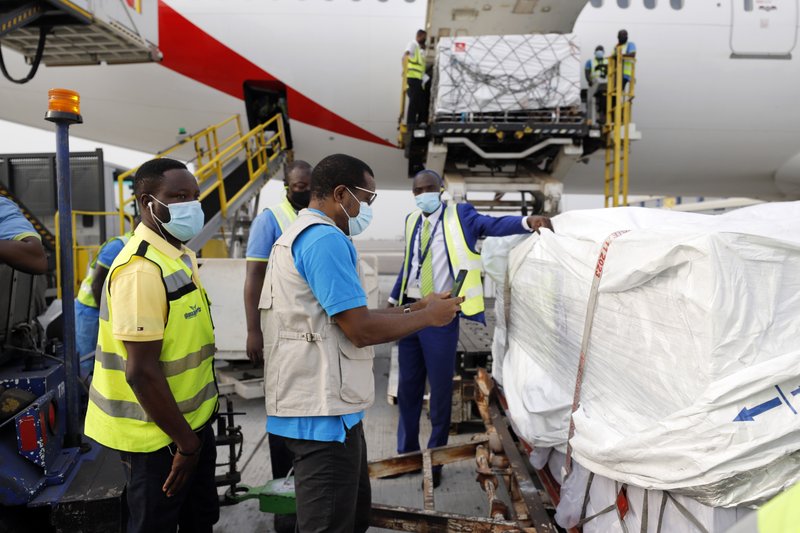New AstraZeneca Vaccine Troubles Put Africa’s Recovery At Risk
Safety concerns over most commonly available and affordable Covid-19 jab could slow continent's recovery.


Several European nations have temporarily halted the rollout of the Oxford-AstraZeneca Covid-19 vaccine over reports of fatal brain hemorrhages and blood clots in people who had received the shot. Spain, Germany, France, and Italy on Monday became the latest countries to suspend the jab as precautionary measures, joining a growing list that includes the Netherlands, Ireland, Denmark, Norway, Iceland, and Thailand.
The latest developments only further dent public confidence in the AstraZeneca shot. Developed in partnership with Oxford University, it has been subject to far more scrutiny than its three other western counterparts produced by Pfizer, Moderna, and Johnson & Johnson.
Tests show it to be safe and effective in preventing infection but an initial confusion about the use of two separate dosing regimens during clinical trials led to a hostile reception. The vaccine is yet to be approved by the United States Food and Drug Administration (FDA), which is conducting separate phase-three clinical trials, while European regulators were reluctant to approve it for people older than 65 because of a lack of adequate testing data on the group.
Also Read: Doubts Emerge Over AstraZeneca-Oxford Uni Vaccine 90% Effectiveness Claim
Germany, the European nation that has backed the jab – apart from the United Kingdom which is its home country – on Monday paused its use, following reports of cases of blood clots and deaths in recipients in Denmark and Norway. Much of Europe has now halted the vaccine for now.
The spate of suspensions comes even as a new wave of coronavirus infections looms over Europe and goes against the advice of international medical agencies. One year after the pandemic began, Italians are back under lockdown restrictions with Easter plans canceled again. Germany on Monday recorded another increase in cases while in France, hospitalisations are again on the rise.


The surge in infections is attributed to the more contagious coronavirus strain first identified in the UK. The strand now accounts for 66% of cases in France, reports say, citing official data.
Amid the pressure, the European Medicines Agency (EMA) has advised countries stick to the rollout of the AstraZeneca shot, saying that a preliminary probe found no indication that the vaccine caused the clotting or the deaths. The World Health Organisation is also investigating the reports of blood clots but its Chief Scientist, Dr. Soumya Swaminathan, has said it “remains unclear” if the vaccine is causing the blood clots.
AstraZeneca insists its vaccine is safe, saying Sunday that it had reviewed safety data of more than 17 million people vaccinated in the European Union and the UK and found no evidence of an “increased risk of pulmonary embolism, deep vein thrombosis or thrombocytopenia, in any defined age group, gender, batch or in any particular country,” Reuters reported.
European health ministers will meet on Thursday to discuss the concerns, but the EMA has said that the benefit of vaccinations outweighs any potential risks. The outcome of the meeting and investigations by WHO will be crucial for a wide range of parties – the vaccine maker, Europe, and even Africa, where most governments can only afford the relatively cheap and easily stored AstraZeneca vaccine.
Also Read: Russian Vaccine 3 Times More Expensive in Africa
The vaccine comes at a lower cost compared to counterparts, priced between $3 and $5 per dose, and can be used in existing healthcare settings such as medical clinics and local pharmacies, as it can be kept at refrigerator temperature. It is being manufactured in multiple countries, by AstraZeneca-SKBio in the Republic of Korea and the Serum Institute of India, the largest vaccine maker globally, hence easing bottlenecks in distribution to the remotest parts of the world. No other vaccine offers Africa as many benefits or hope in its quest to overcome the pandemic, which has infected more than 4 million people on the continent with over 100,000 fatalities.


Africa’s bid to inoculate its population against the pandemic is also hugely reliant on the Covax initiative, a global vaccine sharing program that aims to ensure vaccines are deployed equitably around the world. So far this year, the WHO-led project has made real progress in the distribution of Covid-19 vaccines to low- and middle-income nations, especially in the continent. More than ten countries have received millions of doses of coronavirus vaccines over the past weeks.
The bulk of vaccine doses distributed by Covax to African countries are from AstraZeneca-Oxford, which is the largest supplier to the facility. The WHO has a deal to get 170 million doses of the UK jab, the most of any producer. By contrast, Pfizer is supplying 40 million doses through 2021.
Although the WHO has said its global rollout of vaccines remains unaffected even as a growing number of countries have suspended use of AstraZeneca’s shot, safety concerns over the jab, especially if proven valid by ongoing trials, threaten to slow down Africa’s recovery bid as its ‘broke’ governments will have to rearrange costlier supply deals with other vaccine makers.
Even if proven otherwise, the halt in the vaccine rollout in developed countries over speculations it is linked with side effects may have effects on public confidence in the jab. Persistent doubts may further threaten vaccination exercises and slow down governments’ plan to vaccinate millions of citizens against the virus on the continent.







